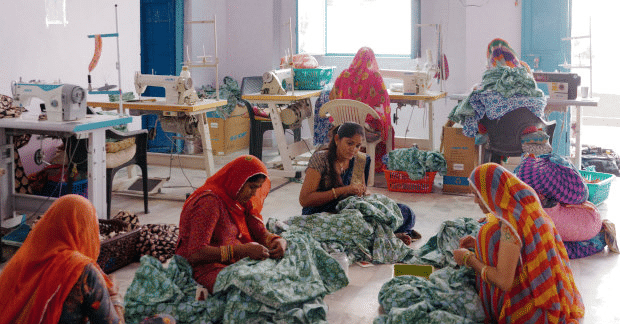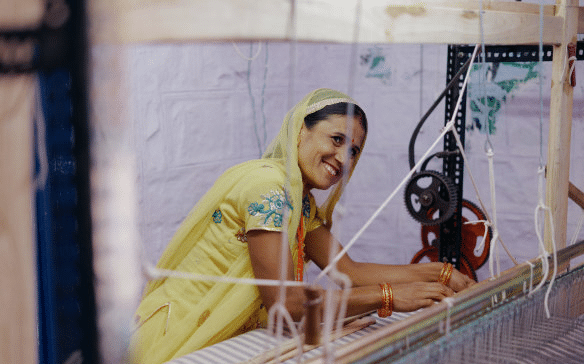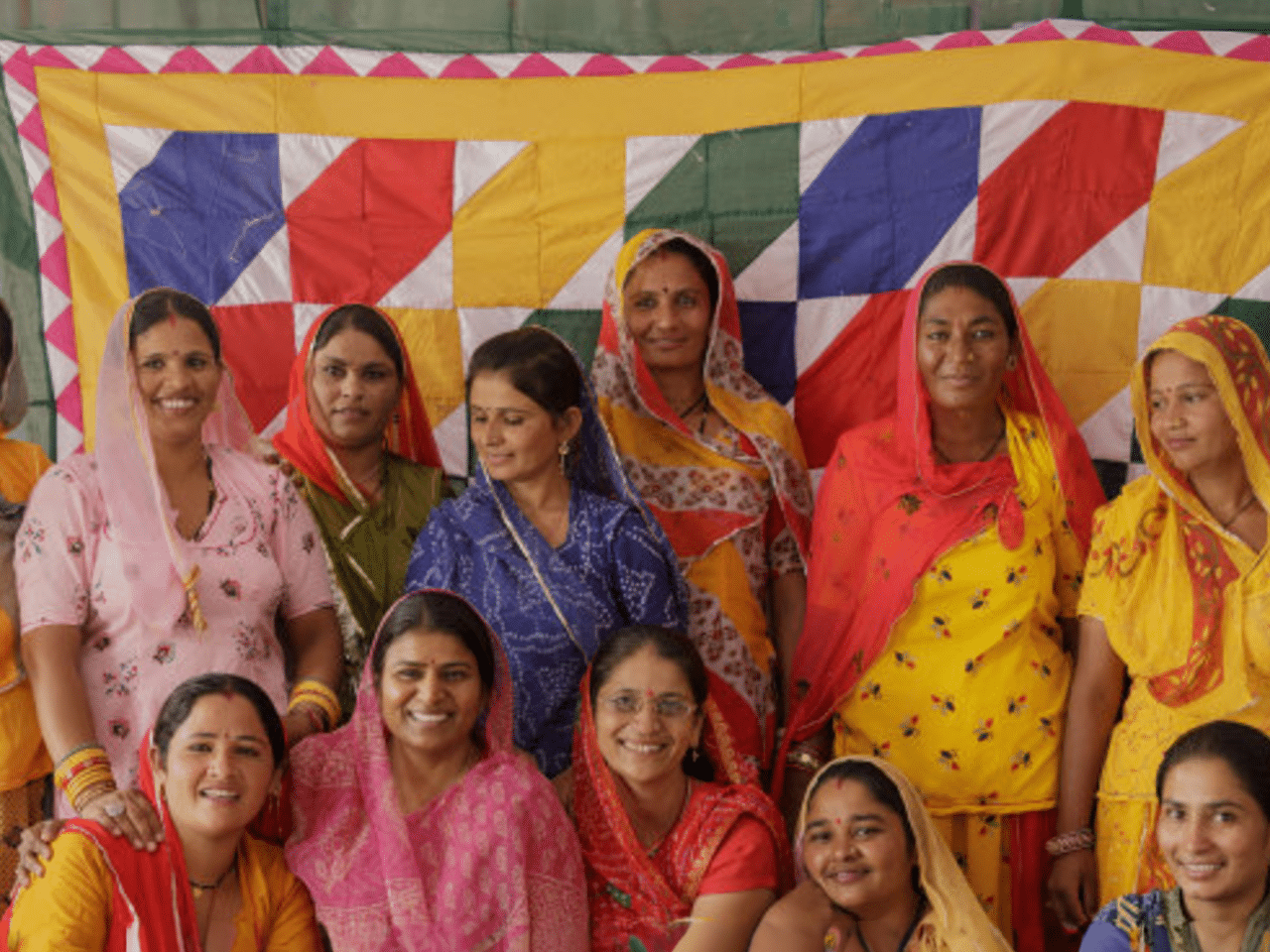A Glimpse into the World of Ethical Fashion: Saheli Women’s Workshop in India
How often do we stop to consider the stories behind the clothes we wear?
Step inside the captivating world of Saheli Women, an atelier in Kaliberi village, Rajasthan, India, where artisans are hard at work creating ethically made garments. Founder Madhu Vaishnav has successfully built a sustainable fashion business that empowers women and teaches them the importance of sustainability. Join me as I explore this unique workshop and learn about the challenges and triumphs of its artisans.

Upon entering Saheli Women’s workshop in Kaliberi village, I am immediately captivated by the vibrant atmosphere. A dozen women, all Pakistani migrants, tirelessly hand-stitch and embroider garments in this large, cool space with candy pink walls and high lavender ceilings. It’s an incredible sight to behold.
Madhu Vaishnav, the bright-eyed founder of Saheli Women, proudly introduces me to the artisans, pointing out their exceptional craftsmanship. These women, who were previously engaged in grueling work in mines and cotton fields, have found joy and fulfillment in their current work. It’s truly inspiring to witness their transformation.
I first heard about Saheli Women through a designer friend who was inspired by Vaishnav to start her own sustainable fashion business. When I had the opportunity to visit Jodhpur, I knew I had to reach out to Vaishnav and experience Saheli’s travel offering firsthand. I immediately booked a five-day immersion program, eager to learn traditional Indian handcraft techniques alongside these talented artisans.
During my time at Saheli Women, Vaishnav acquaints me with the art of natural dyeing, showcasing jars filled with marigold, sappan wood, and onion skin powders. Instead of using harsh chemicals that harm the environment, Saheli Women opts for natural pigments to color their fabrics. It’s a small but meaningful step towards sustainability.
As we continue our tour of the workshop, Vaishnav shares her personal journey of overcoming obstacles to establish Saheli Women. From teaching herself English to convincing her family to support her work, she has faced numerous challenges. Yet, she persevered and started Saheli with just $100 and five women. Today, the workshop employs over 80 artisans, providing them with a good living wage and valuable skills.
One of Vaishnav’s main goals is to give these artisans the respect and voice they deserve. Many of them have never received an education and have faced opposition from their husbands regarding their desire to work outside the home. However, the positive financial impact of Saheli Women’s work has softened the resistance. Money talks, and the men see the positive change it brings to their households.
Beyond developing the artisans’ skills and paying fair wages, Saheli Women inadvertently educates its workers about sustainability. One woman, wearing a canary yellow sari, expresses her newfound understanding of the wastefulness in the fashion industry. She acknowledges that clothes are often discarded, contributing to landfill waste. This realization deepens her appreciation for Saheli Women’s mission.
In a world where the fashion industry’s environmental impact and human rights violations are widely known, Saheli Women stands as a beacon of hope. Witnessing the dedication and passion of these women, who spend hours stitching a single garment, brings a newfound appreciation for the human element in the clothes we wear. From this day forward, I know I will cherish the connection between the creator and the creation.
My journey with Vaishnav doesn’t end at the workshop. She invites me to her home outside Jodhpur’s tourist area, where I learn to grind spices for chai and make delicious pan-fried paratha flatbreads. This intimate experience feels like peering behind a curtain, unveiling the rich tapestry of local life.
The next day, we embark on a two-hour drive to Bhikamkor, a small village on the edge of the Thar Desert. Here, Saheli Women has another workshop where they recently acquired a hand loom. The artisans eagerly gather around, learning the art of hand weaving from a master weaver. The excitement and pride in their eyes are palpable.
As the day comes to a close, Vaishnav takes me to an artisan’s home for a traditional Indian dinner. We sit on the floor, using our hands to savor the delicious food. Afterwards, we carry woven beds to the rooftop, where we’re joined by artisans and their daughters. We lie under the stars, immersed in laughter and conversation.
The following morning, we witness the sunrise over the desert and celebrate the start of Navratri, a Hindu festival honoring the goddess Durga. Participating in activities together, such as cleaning the center and working the handloom, reinforces the bond between these remarkable women and myself. It’s a day filled with emotions, and I struggle to hold back tears of joy.
As the sun sets, Vaishnav leads me to a small temple at the back of the center. Inside, a 90-year-old Rajasthani woman sings and plays a tabla drum, creating an enchanting atmosphere. I sit in front of a small fire, beneath an image of Durga, feeling gratitude wash over me. There’s nothing left to do but express my deepest thanks.
My time with Saheli Women has been nothing short of transformative. Through their dedication to ethical fashion and empowering women, they have made a significant impact on the lives of countless artisans and their village. I leave with a newfound appreciation for sustainable fashion and a promise to support brands like Saheli Women.
In a world where fashion often feels impersonal and detached, Saheli Women serves as a reminder of the humanity behind our clothes. The next time I don a garment, I’ll remember the hands that created it and the stories woven into every stitch.

- Saheli Women produces sustainable garments for international fashion brands
- Founder Madhu Vaishnav empowers women and teaches them about sustainability
- The artisans, many of whom were previously engaged in hard labor, are now creating beautiful hand-stitched and embroidered garments
- The workshop offers a five-day travel experience for those interested in learning traditional Indian handcraft techniques
- Saheli Women is making a positive impact on the lives of its artisans and their entire village
Saheli Women’s workshop in Kaliberi village, Rajasthan, India, is a testament to the power of ethical fashion. Founder Madhu Vaishnav has created a space where artisans can thrive, learn, and make a positive impact. Through the use of sustainable practices and empowering the women she employs, Vaishnav has built a business that goes beyond fashion. It’s a celebration of humanity and a reminder of the importance of respecting and appreciating the hands that create our clothes.
